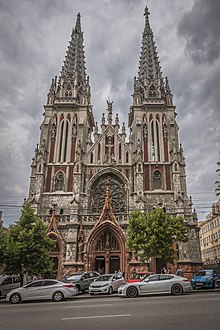St. Nicholas Roman Catholic Cathedral, Kiev
| St. Nicholas Cathedral | |
|---|---|

St. Nicholas Cathedral façade
|
|
| Basic information | |
| Location | vulytsia Velyka Vasylkivska, Pechersk Raion, Kyiv |
| Affiliation | Roman Catholic Church |
| Rite | Latin Rite |
| State | Ukraine |
| Province | Kyiv |
| Region | Eastern Europe |
| Status | Active |
| Website | Official website |
| Architectural description | |
| Architect(s) | Vladislav Gorodetsky |
| Architectural type | cathedral |
| Architectural style | Gothic Revival |
| Completed | 1909 |
| Specifications | |
| Direction of façade | West |
| Height (max) | 60 m (197 ft) |
| Spire(s) | 2 |
The St. Nicholas Roman Catholic Cathedral (Ukrainian: Костел Св. Миколая; translit.: Kostel Sviatoho Mykolaia) is the second Roman Catholic cathedral built in Kyiv, the capital of Ukraine. Today the building is shared between the Roman Catholic Church of Ukraine and the National House of Organ and Chamber Music. Another Catholic church, the , is the oldest Catholic church in the city and is located near the European Square behind the Ukrainian House in Kyiv.
It was constructed from 1899–1909 and was built in a Gothic type construction, by Kyiv architects V. Gorodetsky and E. Sala. Historically, it belonged to the Latin Rite Catholic community. It stands at vulytsia Velyka Vasylkivska (Greater Vasylkiv street) in Pechersk Raion next to the National Linguistic University of Kyiv between the National Sports Complex Olimpiysky and the Railroad station Kyiv-Tovarny.
A competition was held in 1898 for the designs for a Roman Catholic Cathedral in Kyiv, which was won by architect S. Volovskiy. His entry into the competition included a Gothic type construction with two 60 m (197 ft) towers. The final revision and management of the project was assigned to the Kyivan architect Vladislav Gorodetsky, and Emilio Sala added sculptural decoration in artificial stone to the construction. To increase the stability of the construction on the uneven Kyiv ground, it was ensured by bore-and-stuffed piles, a newly introduced invention of Anton Strauss. The construction work was carried out by exclusively from voluntary donations, and lasted for ten years (1899–1909).
...
Wikipedia
